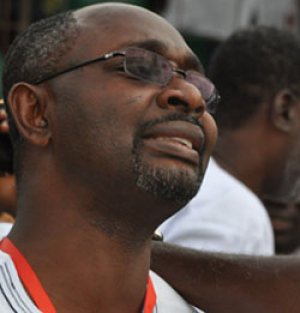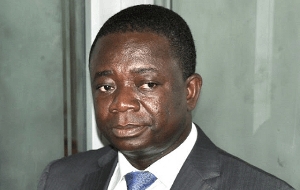- Home - News
- TWI News | TV
- Polls
- Year In Review
- News Archive
- Crime & Punishment
- Politics
- Regional
- Editorial
- Health
- Ghanaians Abroad
- Tabloid
- Africa
- Religion
- Election 2020
- Coronavirus
- News Videos | TV
- Photo Archives
- News Headlines
- Press Release
General News of Thursday, 19 November 2015
Source: classfmonline.com
JDC: Woyome must refund GHC51.2m with interest
The Judgment debt Commission that probed a plethora of judgment debt payments to individuals and institutions has recommended in its report to the President that businessman Alfred Agbesi Woyome must be made to refund with interest, the GHC51.2 million that was paid to him "fraudulently" for work he claimed he did for the country ahead of the hosting of the 2008 Africa Cup of Nations in Accra.
"The Commission recommends that in line with the review decision of the Supreme Court, the State must take all necessary steps to re-call the money paid to Alfred Agbesi Woyome from him with interest," a government White Paper on the probe reported the Commission as recommending.
According to the Apau Commission, "there was no basis for the payment of the sum of over GHC 51 million to Alfred Agbesi Woyome."
"This is because he was not entitled to any such payment as the Economic and Organised Crime Office (EOCO) rightly found and stated in its interim report," the report added.
The Commission also said: "The trial court should have set aside the default judgment it had wrongly entered against the State and allowed the Attorney-General to defend the action as she intimated. The failure of the trial High Court to do so led to the wrong payment of the huge sum of over GHC 51 million to Alfred Agbesi Woyome who did not deserve it in the least."
"The payment to Alfred Agbesi Woyome was inordinate and at the same time fraudulent. It, therefore, constituted a huge financial loss to the State," it noted.
Below are excerpts of the report released by the Attorney General on Wednesday:
Alfred Agbesi Woyome v. Attorney-General and Another
The Commission reviewed the various documentation submitted to it on this matter and established the following:
i. Either through inadvertence or pure mischief through connivance, both the Chief State Attorney Samuel Nerquaye Tetteh who was charged with the defence of the suit in the trial court, and the trial judge did not scrutinise the processes filed before them with judicious eyes.
If the trial judge, particularly, had done so, he would not have granted the application for default judgment in the first place. The bank accounts of the wife of the Chief State Attorney Mrs. Nerquaye Tetteh, was later found by the Economic and Organised Crime Office (EOCO) to have ballooned by the payment into it of the sum of GH 400,000.00 by Alfred Agbesi Woyome after the deal had become successful.
The then Attorney General, in deciding to negotiate with Alfred Agbesi Woyome for the payment of the cedi equivalent of 22,129,501.74 to him as representing 2% of alleged financial engineering costs, was ignorant about the facts of the case Woyome had pleaded in court, but nevertheless went ahead to negotiate and finally ordered for such payment to be made without any scrutiny of his claim and due diligence.
ii. The trial court seriously erred when it granted a default judgment that was procedurally flawed in many aspects. The default judgment was a complete nullity due to the procedural irregularities that completely destroyed its foundation.
• The plaintiff had no mandate under the rules of court to amend his writ of summons twice without leave before pleadings were closed. Order 16 Rule 1(1) gives the plaintiff only one opportunity. He amended his writ of summons twice without leave but the trial court either failed to scrutinise the records before the granting the application or turned a blind eye to it.
• When the plaintiff amended the endorsement on his writ of summons to change completely his cedi claim to a Euro claim with other reliefs, he did not amend his original statement of claim to correspond to the new claim which was completely different from the original claim.
• At the time plaintiff filed the motion for default judgment in default of defence, the defendants had not been served with any Statement of Claim as required under the Rules of Court in support of the amended Writ of Summons to which they could respond by way of a statement of defence.
• On 14th May 2010, just seven (7) days after the service of the amended writ of summons on the 1st defendant, plaintiff caused a motion for judgment in default of defence to be filed. This was contrary to Order 16 Rule 3(2)(b), which provides for a period of fourteen (14) days after the service of an amended statement of claim on the defendant.
iii. Though the parties in the action filed a supposed Terms of Settlement intending it to be adopted as a consent judgment, the State, before the date slated for the adoption of the said terms, had declared its intention not to go by the terms anymore since it had realised it had a defence to the action. That conduct alone served as a caveat to the trial court in treating the terms as Consent Judgment since it had been robbed of its consensual content. The trial court regrettably forced a Consent Judgment on the State.
What the trial court described as a “Consent Judgment” was therefore not a Consent Judgment properly so-called. It was a judgment forced on the State by the trial court, which makes it a complete nullity.
iv. There was no basis for the payment of the sum of over GH 51 million to Alfred Agbesi Woyome. This is because he was not entitled to any such payment as the EOCO rightly found and stated in its interim report.
v. The trial court should have set aside the default judgment it had wrongly entered against the State and allowed the Attorney-General to defend the action as she intimated. The failure of the trial High Court to do so led to the wrong payment of the huge sum of over GH 51 million to Alfred Agbesi Woyome who did not deserve it in the least.
vi. The payment to Alfred Agbesi Woyome was inordinate and at the same time fraudulent. It therefore constituted a huge financial loss to the State.
The Commission recommends that in line with the review decision of the Supreme Court, the State must take all necessary steps to re-call the money paid to Alfred Agbesi Woyome from him with interest.
Government accepts the recommendation of the Commission.
Government is, however, of the view that the Sole Commissioner went outside his remit in attempting to ascribe reasons for Hon. Martin Amidu’s loss of his ministerial job in 2012 when he, the Sole Commissioner, did not have the requisite evidence on the matter.
2. Waterville v. Attorney-General
The Commission found that the amounts claimed by Waterville had in fact been paid to the company through its sub-contractors, Micheletti & Co and Consar Ltd in or around 2006.
The Commission found that the Attorney-General should have contested the matter for it to be determined on its merits, rather than appoint a mediator who recommended that the Government settle the claim for an amount of 25,000,000.00, which amount the Attorney General accepted to pay in five installments of 5,000,000.00 per installment.
The Commission, having noted that the Supreme Court had decreed this payment as “wrongful, unwarranted and null and void ab initio” and having ordered the Company to refund the amount to the Government, recommended that the State should take the necessary steps to retrieve the amount from Waterville since Waterville was not entitled to it.
Government accepts the recommendation of the Commission. Government, however, notes that Waterville has instituted proceedings against the Government of Ghana before the International Court of Arbitration (ICC), challenging Government’s attempts to recover the money from Waterville (Waterville Holdings BVI Limited v. the Attorney-General, Republic of Ghana). Government is defending the action.
3. Isofoton S.A. v. Attorney-General
The Commission made the following findings of fact:
i. Isofoton S.A., a Spanish company signed a contract with the Ministry of Energy in 2001, which was subsequently re-assigned to another Spanish company Elecnor. Isofoton further signed a contract with the Ministry of Agriculture in 2005, which was subsequently re-assigned to another Spanish company Incatcma Indema. Both re-assignments were done on the orders of the Office of the President at the time.
ii. The Attorney-General, Hon. Joe Ghartey, wrote to advise the Minister for Finance and Economic Planning that the action by the Office of the President in re-assigning the two contracts amounted to breach of the contracts which would be detrimental to the Government and, in consequence, impose substantial financial burden on the State. He advised an amicable settlement be reached. The Minister for Finance did not reach an amicable settlement.
iii. The company sued the Government. The Attorney General failed to defend the actions and the company obtained a default judgment in the High Court on November 5, 2008.
iv. On November 18, 2008, the Attorney General filed a motion to have the two default judgments set aside. The matter was not concluded when the Fifth Government of the Fourth Republic entered office. The High Court ordered an out-of-court settlement. The Government failed to settle the agreed amounts.
The company initiated garnishee proceedings against the State.
v. The new Attorney-General, Hon. Martin Amidu, filed an application to have the garnishee order set aside but failed. On the basis of the pending High Court judgment, the State m ade a payment of GHC 488,208.00 in March 2011, leaving a balance of US$974,528.00.
vi. Thereafter, Hon. Amidu lost his position as Attorney General but went ahead to initiate a private suit in the Supreme Court for a declaration that the contracts were null and void. The Supreme Court ruled that the two contracts were null, void and without effect whatsoever since they had not been laid before and approved by Parliament in accordance with article 181(5) of the 1992 Constitution.
The court therefore ordered Isofoton S.A. to refund the part-payment of the settlement debt already made by the State.
vii. The Commission considered itself bound by the decision of the Supreme Court and therefore recommended that the State take steps to retrieve, from Isofoton S.A., the moneys paid to them.
Government accepts the recommendation of the Commission.
Government, however, notes that international tribunals have not agreed entirely with our Supreme Court decisions in Balkan, Waterville and Isofoton cases in relation to Article 181(5) of the 1992 Constitution.
In particular, in the case of Bankswitch Ghana Limited v. Government of Ghana, the arbitral tribunal established under the auspices of the Permanent Court of Arbitration (PCA), in its award of April 11, 2014, held that based on the customary international law principles of estoppel, the Government of Ghana was precluded from arguing that the Bankswitch Agreement was unenforceable under Article 181(5) of the 1992 Constitution.











